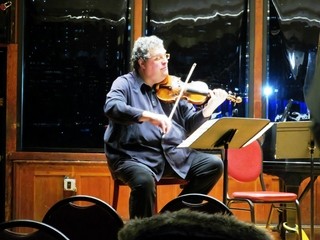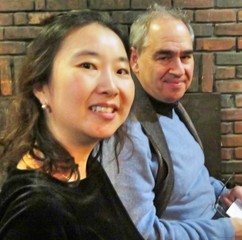|
Back
Trenchant Themes and Vacuous Variations New York
BargeMusic, Brooklyn
01/04/2019 -
Scott Wheeler: Whispered Sarabande (World Premiere)
Dina Pruzhansky: Under the Red Moon (United States Premiere)
Joel Hoffman: étude – pour les symmetries
Robert Kendall: Brevis historia mundi (World Premiere)
Alex Weiser: Silent for the Rain (World Premiere)
David Taylor: Der Leiermann – Ghironda Galumphtoso
Daniel Schnyder: Mondnacht – Der Mann im Mond und des Moncalb Dany – Ballad and Riffs (World Premiere)
Mark Peskanov (Artistic Director, Violin), Semplice Players: Paul Won Jin Cho (Clarinet), Adelya Nartadjieva (Violin), Julian Schwarz (Cello), Dina Pruzhansky (Piano); Marika Borunaki, Woori Kim, Maxwell Foster (Pianists), Andrew Gonzalez (Viola), David Taylor (Bass trombone), Daniel Schnyder (Tenor saxophone, alto flute etc), Cécile Grüebler (Cello)

M. Peskanov (© Samuel A. Dog)
“The Bass Trombone: A quaint and antique drainage system applied to the face.”
Sir Thomas Beecham (1879-1961)
Mark Peskanov, the BargeMusic Artistic Director, presents a year full of the most imaginative programs on his swaying craft virtually every week, He brings onto stage celebrated composers like Frederic Rzewski or David Del Tredici, as well as instrumentalists worthy of these writers. And around the end-of-year-holidays, he sprouts wings for even more inspiration. It might be an evening filled with Bach or an afternoon of other Baroque composers. Or–as last night–a concert of world and American premieres, played by the most deft soloists, including Mr. Peskanov himself.
The eight composers are not household names (at least not this household) nor did they come near to producing a chamber Sacre, Wozzeck or Grosse Fuge to shatter music’s looking glass. But each was, evocative, mediational, colorful and even one with a rare complex humor. And like more and more frequent concerts in New York, the composers were on hand to give short descriptions of their work.
Mr. Peskanov started the evening with Scott Wheeler’s Whispered Sarabande, a solo set of dark melodies, muted almost plucked, going from the Cimmerian depths of the instrument to the highest note. No embellishments, no syncretic quotes (did I catch two Bach-ish measures toward the end?), with nothing but the grace which its title evoked.
The pianist of “Semplice Players”, Dina Pruzhansky, produced a very Semitic Under the Red Moon, with a Klezmer-sounding clarinet (Paul Won Jin Cho), cascades from the composer and discreet accompaniment from violin and cello.
Cellist Julian Schwarz had few moments to shine there, but in the following Silent for the Rain, he gave one of the most thrilling performances of the evening. I don’t remember that much of Alex Weiser’s work, but Mr. Schwarz produced a deep rich tone, a highly Romantic aura, an emotional depth that would have embellished any music for which he was part.

W. Kim, J. Hoffman (© Samuel A. Dog)
I mentioned “humor” above, but Joel Hoffman’s drollness was hardly that of a Richard Pryor. Rather, the splendid pianist Woori Kim faultlessly played a torrent of notes in his étude – pour les symmetries, which had the convoluted algebraic fascination of an ancient-Greek syllogism.
The “symmetries” were not a simple a-b-a-b mirror image or a Bartókian game of twos. Rather, when one got into the heart of it, every single phrase reflected–or at least parodied or varied–itself in the following phrase. The simplest measures by Ms. Kim seemed to organically build, but that was an illusion, since these measures were re-animated by Mr. Hoffman’s game or endless mirrors and Ms. Kim’s own animated performance. Where previous performances were “enjoyed” (I hate that word), these actually drew the brain cortex into a Xeno-like paradox which left the listener whirling.
Before the performance, violist Andrew Gonzalez and pianist Maxwell Foster had been practicing on stage, and I had reckoned this was either an obscure 1880’s duet, or the pair had been playing two different works. The truth was that Mr. Kendall’s Brevis historia mundi– masterful, dextrous, supremely accomplished–was indeed the music I had heard before.
In other words, both viola and piano were playing (seemingly) separate works of...er...Brahms? The sounds were luscious, the melodies were rich and warm-hearted, the performances of two noteworthy musicians. But to put the words 2019 or even 1949 to the dates would have been an anachronism.
The last works were written and performed by bass trombonist David Taylor and wind player Daniel Schnyder, with cellist Cécile Grüebler. Mr. Taylor is the most famous bass trombonist in the world, a much sought-after sessions artist for Aretha and Barbra and virtually everybody else in the musical world.
More power to him (and his “slide-of-hand” legerdemain).
Alas, as he did once before here, his “recital” was perpetuated (in the deficient calculus of my mind) for 17 hours. Without the slightest attempt to reach out, the wind-brass duets and Ms. Grüebler’s hopeless background, lingered in that barren Purgatory between be-bop and vacuous variations on nihilistic phrases.
For the first time ever in BargeMusic, without a clue when they would stop, I quietly tiptoed out, and–like Walt Whitman– “rising and gliding out... wander’d off by myself/In the mystical moist night-air, and from time to time,/Look’d up in perfect silence at the stars.”
Harry Rolnick
|